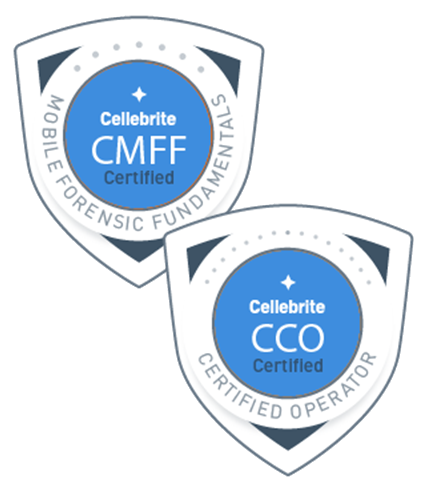
Cellebrite Mobile Forensics Fundamentals + Cellebrite Certified Operator
Date: 29 - 31 Jan 2018 Days: Mon-Wed Hours: 9:00 AM - 5:00 PM
Course type: Instructor Led
Region: North America
Location: Westminster, CO, United States
Capacity:Few seats left
Enroll by: 29 Jan 2018
Log in to see the options to register for this course. If you do not already have an account, create your FREE account. Creating an account does not obligate you to enroll or pay for classes.
About this course
Description
About CMFF:
The Cellebrite Mobile Forensics Fundamentals (CMFF) course is a 1-day entry level program designed for investigators to identify mobile device hardware and understand the general the forensic process. Students will learn how the four phases of the forensics process are related and demonstrate how to handle devices following best practices. Students will also conduct basic analysis of extracted device data and generate reports using UFED Reader software. About CCO:
The Cellebrite Certified Operator (CCO) course is a 2-day intermediate level certification program which builds on the concepts from the CMFF course. This course is designed for those participants tasked with extracting data in a forensically sound manner using UFED Touch or UFED 4PC. This course aims to teach data extraction team members such as technically savvy investigators, digital forensic examiners, IT staff, internal affairs investigators, first responders and personnel designated to handle extraction of digital evidence how to perform extractions on a variety of devices. These extractions include logical, file system and physical extractions from mobile devices as well SIM cards, and external storage such as SD cards. Participants in this course will gain a basic understanding of how to open the extractions in Physical Analyzer software, conduct basic searches and how to create bookmarks and reports. NOTE: It is strongly recommended that students attending this course complete the Cellebrite Mobile Forensics Fundamentals (CMFF) course or test out prior to attending.
The Cellebrite Mobile Forensics Fundamentals (CMFF) course is a 1-day entry level program designed for investigators to identify mobile device hardware and understand the general the forensic process. Students will learn how the four phases of the forensics process are related and demonstrate how to handle devices following best practices. Students will also conduct basic analysis of extracted device data and generate reports using UFED Reader software. About CCO:
The Cellebrite Certified Operator (CCO) course is a 2-day intermediate level certification program which builds on the concepts from the CMFF course. This course is designed for those participants tasked with extracting data in a forensically sound manner using UFED Touch or UFED 4PC. This course aims to teach data extraction team members such as technically savvy investigators, digital forensic examiners, IT staff, internal affairs investigators, first responders and personnel designated to handle extraction of digital evidence how to perform extractions on a variety of devices. These extractions include logical, file system and physical extractions from mobile devices as well SIM cards, and external storage such as SD cards. Participants in this course will gain a basic understanding of how to open the extractions in Physical Analyzer software, conduct basic searches and how to create bookmarks and reports. NOTE: It is strongly recommended that students attending this course complete the Cellebrite Mobile Forensics Fundamentals (CMFF) course or test out prior to attending.
Learning objectives
- Identify mobile device hardware
-
Discuss how devices communicate
-
Describe where mobile device information can be stored
-
Describe the four phases of the digital forensics process
-
Describe the importance of evidence handling and documentation
-
Identify tools and equipment for seizing mobile devices as evidence
-
Demonstrate procedures for seizing mobile devices in a manner that preserves evidence integrity
-
State the order of acquisitions
-
Describe tools and techniques for acquiring data from mobile
devices
-
Define the types of data encoding used on mobile devices: binary, hexadecimal, ASCII, Unicode
-
Demonstrate techniques for decoding data stored in mobile devices
Class details
Westminster PD 9110 Yates St Westminster, CO 80031 POC: David Acunto
Denver Intl Airport
Drury Inn
Westin